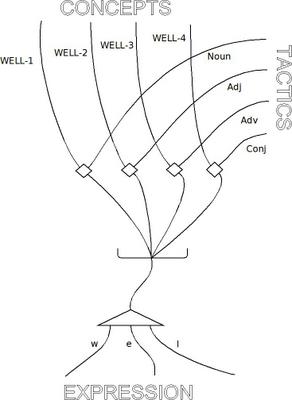Difference between revisions of "Tactic connector"
Jump to navigation
Jump to search
(New entry.) |
m |
||
| Line 12: | Line 12: | ||
What we have corresponding to this four-way ambiguity is an upward [[OR node]] with four lines leading up to four tactic connectors, which bring together realizational lines from the conceptual system, one for each sense, with incoming lines from the tactics that determine which sense gets realized as the expression "well". | What we have corresponding to this four-way ambiguity is an upward [[OR node]] with four lines leading up to four tactic connectors, which bring together realizational lines from the conceptual system, one for each sense, with incoming lines from the tactics that determine which sense gets realized as the expression "well". | ||
| − | [[image well2a.jpg]] | + | [[image:well2a.jpg]] |
=== Source === | === Source === | ||
Revision as of 22:33, 20 October 2009
A tactic connector in a relational network is a point at which the tactics interconnects with the realizational lines. Notated as a diamond, a small rotated square, which corresponds to the term, diamond node, by which it was known formerly.
Example
"Well" in English is ambiguous:
- A noun meaning the hole in the ground with water at the bottom.
- An adjective opposed to sick.
- An adverb corresponding to "good".
- A conjunction, as in "Well, I don't know."
What we have corresponding to this four-way ambiguity is an upward OR node with four lines leading up to four tactic connectors, which bring together realizational lines from the conceptual system, one for each sense, with incoming lines from the tactics that determine which sense gets realized as the expression "well".
Source
- Lamb, Sydney M.. 2004. Language and Reality: Selected Writings of Sydney Lamb. London: Continuum.
